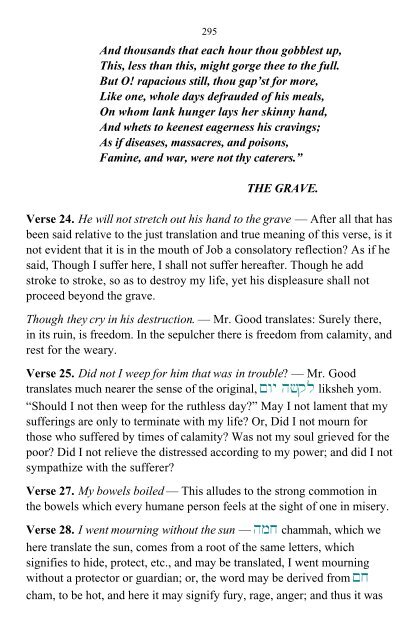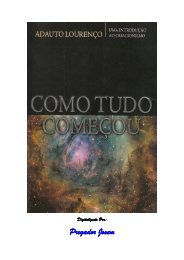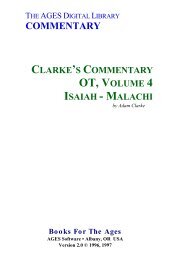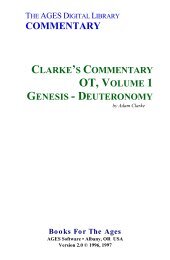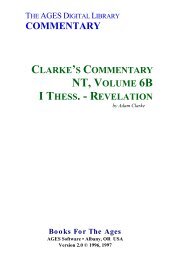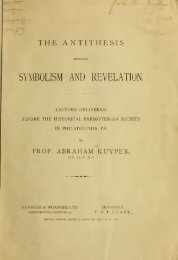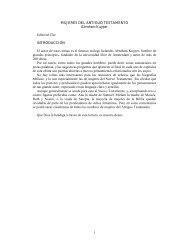Attention! Your ePaper is waiting for publication!
By publishing your document, the content will be optimally indexed by Google via AI and sorted into the right category for over 500 million ePaper readers on YUMPU.
This will ensure high visibility and many readers!

Your ePaper is now published and live on YUMPU!
You can find your publication here:
Share your interactive ePaper on all platforms and on your website with our embed function

You also want an ePaper? Increase the reach of your titles
YUMPU automatically turns print PDFs into web optimized ePapers that Google loves.
295<br />
And thousands that each hour thou gobblest up,<br />
This, less than this, might gorge thee to the full.<br />
But O! rapacious still, thou gap’st for more,<br />
Like one, whole days <strong>de</strong>frau<strong>de</strong>d of his meals,<br />
On whom lank hunger lays her skinny hand,<br />
And whets to keenest eagerness his cravings;<br />
As if diseases, massacres, and poisons,<br />
Famine, and war, were not thy caterers.”<br />
THE GRAVE.<br />
Verse 24. He will not stretch out his hand to the grave — After all that has<br />
been said relative to the just translation and true meaning of this verse, is it<br />
not evi<strong>de</strong>nt that it is in the mouth of Job a consolatory reflection? As if he<br />
said, Though I suffer here, I shall not suffer hereafter. Though he add<br />
stroke to stroke, so as to <strong>de</strong>stroy my life, yet his displeasure shall not<br />
proceed beyond the grave.<br />
Though they cry in his <strong>de</strong>struction. — Mr. Good translates: Surely there,<br />
in its ruin, is freedom. In the sepulcher there is freedom from calamity, and<br />
rest for the weary.<br />
Verse 25. Did not I weep for him that was in trouble? — Mr. Good<br />
translates much nearer the sense of the original, µwy hçql liksheh yom.<br />
“Should I not then weep for the ruthless day?” May I not lament that my<br />
sufferings are only to terminate with my life? Or, Did I not mourn for<br />
those who suffered by times of calamity? Was not my soul grieved for the<br />
poor? Did I not relieve the distressed according to my power; and did I not<br />
sympathize with the sufferer?<br />
Verse 27. My bowels boiled — This allu<strong>de</strong>s to the strong commotion in<br />
the bowels which every humane person feels at the sight of one in misery.<br />
Verse 28. I went mourning without the sun — hmj chammah, which we<br />
here translate the sun, comes from a root of the same letters, which<br />
signifies to hi<strong>de</strong>, protect, etc., and may be translated, I went mourning<br />
without a protector or guardian; or, the word may be <strong>de</strong>rived from µj<br />
cham, to be hot, and here it may signify fury, rage, anger; and thus it was
294 cast off; it is as closely attached to me as the collar of my coat. Or, my disease seizes me as a strong armed man; it has throttled me, and cast me in the mud. This is probably an allusion to two persons struggling: the stronger seizes the other by the throat, brings him down, and treads him in the dirt. Verse 20. I cry unto thee — I am persecuted by man, afflicted with sore disease, and apparently forsaken of God. I stand up — Or, as some translate, “I persevere, and thou lookest upon me.” Thou seest my <strong>de</strong>solate, afflicted state; but thine eye doth not affect thy heart. Thou leavest me unsupported to struggle with my adversities. Verse 21. Thou art become cruel to me — Thou appearest to treat me with cruelty. I cry for mercy, trust in thy goodness, and am still permitted to remain un<strong>de</strong>r my afflictions. Thou opposest thyself — Instead of helping, thou opposest me; thou appearest as my enemy. Verse 22. Thou liftest me up to the wind — Thou hast so completely stripped me of all my substance, that I am like chaff lifted up by the wind; or as a straw, the sport of every breeze; and at last carried totally away, being dissipated into particles by the continued agitation. Verse 23. Thou wilt bring me to <strong>de</strong>ath — This must be the issue of my present affliction: to God alone it is possible that I should survive it. To the house appointed for all living. — Or to the house, d[wm moed, the ren<strong>de</strong>zvous, the place of general assembly of human beings: the great <strong>de</strong>vourer in whose jaws all that have lived, now live, and shall live, must necessarily meet. “ — O great man-eater! Whose every day is carnival; not sated yet! Unheard of epicure! without a fellow! The veriest gluttons do not always cram! Some intervals of abstinence are sought To edge the appetite: thou seekest none. Methinks the countless swarms thou hast <strong>de</strong>vour’d,
295 And thousands that each hour thou gobblest up, This, less than this, might gorge thee to the full. But O! rapacious still, thou gap’st for more, Like one, whole days <strong>de</strong>frau<strong>de</strong>d of his meals, On whom lank hunger lays her skinny hand, And whets to keenest eagerness his cravings; As if diseases, massacres, and poisons, Famine, and war, were not thy caterers.” THE GRAVE. Verse 24. He will not stretch out his hand to the grave — After all that has been said relative to the just translation and true meaning of this verse, is it not evi<strong>de</strong>nt that it is in the mouth of Job a consolatory reflection? As if he said, Though I suffer here, I shall not suffer hereafter. Though he add stroke to stroke, so as to <strong>de</strong>stroy my life, yet his displeasure shall not proceed beyond the grave. Though they cry in his <strong>de</strong>struction. — Mr. Good translates: Surely there, in its ruin, is freedom. In the sepulcher there is freedom from calamity, and rest for the weary. Verse 25. Did not I weep for him that was in trouble? — Mr. Good translates much nearer the sense of the original, µwy hçql liksheh yom. “Should I not then weep for the ruthless day?” May I not lament that my sufferings are only to terminate with my life? Or, Did I not mourn for those who suffered by times of calamity? Was not my soul grieved for the poor? Did I not relieve the distressed according to my power; and did I not sympathize with the sufferer? Verse 27. My bowels boiled — This allu<strong>de</strong>s to the strong commotion in the bowels which every humane person feels at the sight of one in misery. Verse 28. I went mourning without the sun — hmj chammah, which we here translate the sun, comes from a root of the same letters, which signifies to hi<strong>de</strong>, protect, etc., and may be translated, I went mourning without a protector or guardian; or, the word may be <strong>de</strong>rived from µj cham, to be hot, and here it may signify fury, rage, anger; and thus it was
- Page 1 and 2:
THE AGES DIGITAL LIBRARY COMMENTARY
- Page 3 and 4:
3 EDITOR’S NOTES Preparing Clarke
- Page 5 and 6:
5 PREFACE TO THE BOOK OF JOB THIS i
- Page 7 and 8:
7 With respect to the first and sec
- Page 9 and 10:
9 Introductory Dissertation; who pr
- Page 11 and 12:
11 “every one of these features i
- Page 13 and 14:
13 EXODUS 15:7. Thou sentest forth
- Page 15 and 16:
16. Yet now art thou numbering my s
- Page 17 and 18:
17 As the argument for Moses has be
- Page 19 and 20:
19 those books, and which argue an
- Page 21 and 22:
Psalm 107:40: He poureth contempt u
- Page 23 and 24:
23 For my own part, I think the lat
- Page 25 and 26:
25 certain evidence of the author o
- Page 27 and 28:
27 “This is translated from the S
- Page 29 and 30:
29 the Hebrew, like the modern lang
- Page 31 and 32:
31 “Thus, in about two hundred an
- Page 33 and 34:
33 and laid in a distant place enti
- Page 35 and 36:
35 PART 2. — FIRST S ERIES OF CON
- Page 37 and 38:
37 altogether irrelevant; accuses J
- Page 39 and 40:
39 different intervals, pausing for
- Page 41 and 42:
41 borrow Job, not very dissimilar
- Page 43 and 44:
43 troops of angels. The Syriac ret
- Page 45 and 46:
45 and, consequently, they will bec
- Page 47 and 48:
Verse 14. The asses feeding beside
- Page 49 and 50:
49 “Good when he gives, supremely
- Page 51 and 52:
51 office in such cases, see Deuter
- Page 53 and 54:
53 Verse 4. Skin for skin — That
- Page 55 and 56:
55 Quid vos sacra juvant? quid nunc
- Page 57 and 58:
57 Verse 12. They rent every one hi
- Page 59 and 60:
59 mind, as his consolations most u
- Page 61 and 62:
61 from which we may gather Job’s
- Page 63 and 64:
had neither been received into a mo
- Page 65 and 66:
65 “With equal pace impartial Fat
- Page 67 and 68:
67 waves and thy billows have gone
- Page 69 and 70:
69 CHAPTER 4 Eliphaz answers; and a
- Page 71 and 72:
71 forth good fruit, but a corrupt
- Page 73 and 74:
73 It stood still, to present itsel
- Page 75 and 76:
ighteous is taken away from the evi
- Page 77 and 78:
77 CHAPTER 5 Eliphaz proceeds to sh
- Page 79 and 80:
79 whole day. Six or seven dates, s
- Page 81 and 82:
81 the contingent, capricious, and
- Page 83 and 84:
“In the famine of Egypt he redeem
- Page 85 and 86:
85 Like as a shock of corn — Thou
- Page 87 and 88:
87 CHAPTER 6 Job answers, and vindi
- Page 89 and 90:
89 Verse 9. Let loose his hand —
- Page 91 and 92:
91 A FRIEND IN NEED is a FRIEND IND
- Page 93 and 94:
gladly receive your counsels, and a
- Page 95 and 96:
95 CHAPTER 7 Job continues to deplo
- Page 97 and 98:
97 very rigid, so as to crack acros
- Page 99 and 100:
lwaç, which we properly enough tra
- Page 101 and 102:
101 to think thus seriously about h
- Page 103 and 104:
103 CHAPTER 8 Bildad answers, and r
- Page 105 and 106:
105 laying up knowledge: nor could
- Page 107 and 108:
107 but the blast of God is come up
- Page 109 and 110:
109 translation, and refer to his l
- Page 111 and 112:
111 CHAPTER 9 Job acknowledges God
- Page 113 and 114:
113 VULGATE, Qui facit Arcturum, et
- Page 115 and 116:
115 conviction of the exceeding bre
- Page 117 and 118:
117 place. They flee away — The C
- Page 119 and 120:
119 matter for trial. — Idem. But
- Page 121 and 122:
121 and conclusions are founded on
- Page 123 and 124:
123 CHAPTER 10 Job is weary of life
- Page 125 and 126:
125 pains expended, men might natur
- Page 127 and 128:
127 Verse 18. Wherefore then — Wh
- Page 129 and 130:
129 CHAPTER 11 Zophar answers Job,
- Page 131 and 132:
131 and that, therefore, Job’s co
- Page 133 and 134:
133 To man are the preparations of
- Page 135 and 136:
135 seems to have had a full convic
- Page 137 and 138:
137 For a vindication of this versi
- Page 139 and 140:
139 Also he sendeth them out — He
- Page 141 and 142:
141 parallel girdles, fifty-two in
- Page 143 and 144:
143 CHAPTER 13 Job defends himself
- Page 145 and 146:
145 Verse 9. Is it good that he sho
- Page 147 and 148:
147 Verse 22. Then call thou — Be
- Page 149 and 150:
149 CHAPTER 14 The shortness, miser
- Page 151 and 152:
151 sixty-nine; but these are rare
- Page 153 and 154:
153 understood as implying Job’s
- Page 155 and 156:
155 creature to vanity, in hope; ha
- Page 157 and 158:
157 before the window is closed ove
- Page 159 and 160:
159 CHAPTER 15 Eliphaz charges Job
- Page 161 and 162:
161 What understandest thou — Or,
- Page 163 and 164:
163 Verse 14. What is man, that he
- Page 165 and 166:
165 As a king ready to the battle.
- Page 167 and 168:
167 perish before his time; before
- Page 169 and 170:
169 “With my own mouth will I ove
- Page 171 and 172:
171 the several allusions made in S
- Page 173 and 174:
173 many passages in the Book of Jo
- Page 175 and 176:
175 Verse 3. Lay down now — Depos
- Page 177 and 178:
177 The thoughts of my heart. — A
- Page 179 and 180:
179 CHAPTER 18 Bildad, in a speech
- Page 181 and 182:
181 Verse 6. The light shall be dar
- Page 183 and 184:
183 And OVID, Metam. lib. v., ver.
- Page 185 and 186:
185 Unde etiam, says Servius, in sa
- Page 187 and 188:
187 CHAPTER 19 Job complains of the
- Page 189 and 190:
189 opponent, and by this means the
- Page 191 and 192:
191 Verse 20. My bone cleaveth to m
- Page 193 and 194:
193 of writing or perpetuating publ
- Page 195 and 196:
195 and that Job’s friends saw it
- Page 197 and 198:
197 This, on the mode of interpreta
- Page 199 and 200:
199 on high.’ Then come the words
- Page 201 and 202:
201 CHAPTER 20 Zophar answers Job,
- Page 203 and 204:
203 His hands shall restore their g
- Page 205 and 206:
205 Verse, pure as milk, to thee I
- Page 207 and 208:
207 It may be inquired how Mr. Good
- Page 209 and 210:
209 In the fullness of his sufficie
- Page 211 and 212:
211 not, I have added considerable
- Page 213 and 214:
213 CHAPTER 21 Job expresses himsel
- Page 215 and 216:
215 tom-tom of the Asiatics. rwnk k
- Page 217 and 218:
217 seed is cut off from the earth.
- Page 219 and 220:
219 or intestines, are full of, or
- Page 221 and 222:
221 To pompous funeral processions;
- Page 223 and 224:
223 CHAPTER 22 Eliphaz reproves Job
- Page 225 and 226:
225 Good translates: “Or darkness
- Page 227 and 228:
227 interest in his favor, from whi
- Page 229 and 230:
229 Arabic, (Arabic) or (Arabic) an
- Page 231 and 232:
231 Verse 6. Will he plead against
- Page 233 and 234:
233 pavement. It has its name from
- Page 235 and 236:
235 I loathe myself when God I see,
- Page 237 and 238:
237 Verse 2. Some remove the landma
- Page 239 and 240:
239 And embrace the rock for want o
- Page 241 and 242:
241 2They are indignant of the ligh
- Page 243 and 244: 243 chata signifies to miss the mar
- Page 245 and 246: 245 where there was nothing equivoc
- Page 247 and 248: 247 which generally lead to the mos
- Page 249 and 250: 249 Verse 4. How then can man be ju
- Page 251 and 252: 251 CHAPTER 26 Job, perceiving that
- Page 253 and 254: 253 to be supposed that in the word
- Page 255 and 256: 255 Verse 11. The pillars of heaven
- Page 257 and 258: 257 once a natural and very apparen
- Page 259 and 260: 259 CHAPTER 27 Job strongly asserts
- Page 261 and 262: 261 “How shocking must thy summon
- Page 263 and 264: 263 victory. These are no common de
- Page 265 and 266: 265 Verse 20. Terrors take hold on
- Page 267 and 268: 267 stone is poured out for brass.
- Page 269 and 270: 269 that catastrophe, there being n
- Page 271 and 272: 271 Nec tantum segetes alimentaque
- Page 273 and 274: 273 multiply the comforts and luxur
- Page 275 and 276: 275 coast, and in the Ethiopic ocea
- Page 277 and 278: 277 evil; things point blank contra
- Page 279 and 280: 279 his fall. He had before sought
- Page 281 and 282: 281 Though it may appear more curio
- Page 283 and 284: 283 Scriptures; and others of them
- Page 285 and 286: 285 bare.” Mr. Harmer supposes th
- Page 287 and 288: 287 Verse 18. I shall die in my nes
- Page 289 and 290: 289 CHAPTER 30 Job proceeds to lame
- Page 291 and 292: 291 tree were an article of food; a
- Page 293: 293 sand from under the feet, and t
- Page 297 and 298: 297 CHAPTER 31 Job makes a solemn p
- Page 299 and 300: 299 the way of scortation and concu
- Page 301 and 302: 301 father; and I was their guide f
- Page 303 and 304: 303 Verse 30. Neither have I suffer
- Page 305 and 306: 305 Verse 36. Surely I would take i
- Page 307 and 308: 307 seems to mean to hold, catch as
- Page 309 and 310: 309 say that no other interpretatio
- Page 311 and 312: 311 CHAPTER 32 Elihu comes forward,
- Page 313 and 314: 313 Verse 7. Days should speak —
- Page 315 and 316: 315 God thrusteth him down, not man
- Page 317 and 318: 317 civil, or military, are always
- Page 319 and 320: 319 CHAPTER 33 Elihu offers himself
- Page 321 and 322: 321 Verse 15. I. In a DREAM-when de
- Page 323 and 324: 323 breath. The latter draws near
- Page 325 and 326: 325 bring forth all the fruits of t
- Page 327 and 328: 327 Spirit) with joy, (h[wrtb bithr
- Page 329 and 330: 329 Verse 6. Should I lie against m
- Page 331 and 332: 331 Apostata? Qui vocat duces impio
- Page 333 and 334: 333 The servant having delivered th
- Page 335 and 336: 335 Pater mi, probetur Job. But it
- Page 337 and 338: 337 said the governor. Why, send me
- Page 339 and 340: 339 Look upon these, consider them
- Page 341 and 342: 341 not only of Job’s three frien
- Page 343 and 344: 343 Verse 3. I will fetch my knowle
- Page 345 and 346:
345 that this is literally or spiri
- Page 347 and 348:
347 Thou hast wrought iniquity? —
- Page 349 and 350:
349 “Who can understand the sprea
- Page 351 and 352:
351 God is represented as covering
- Page 353 and 354:
353 CHAPTER 37 Elihu continues to s
- Page 355 and 356:
355 fluid being too much diffused,
- Page 357 and 358:
357 rain, snow, hail, frost, ice, e
- Page 359 and 360:
359 I have only to observe, that in
- Page 361 and 362:
361 And caused the light of his clo
- Page 363 and 364:
363 “Even now we cannot look at t
- Page 365 and 366:
365 reasoning and description; he c
- Page 367 and 368:
367 were formed after this manner.
- Page 369 and 370:
369 every moment passing from under
- Page 371 and 372:
371 out, so that the upper side of
- Page 373 and 374:
373 Verse 21. Knowest thou — This
- Page 375 and 376:
375 A way for the lightning of thun
- Page 377 and 378:
377 the ground. Every tribe of anim
- Page 379 and 380:
379 departing from the ancient vers
- Page 381 and 382:
381 Verse 38. When the dust groweth
- Page 383 and 384:
383 autem, viri fortes, satisfacere
- Page 385 and 386:
385 Caesars, emperors of Rome. I ha
- Page 387 and 388:
387 and unfought martial exploits o
- Page 389 and 390:
389 in his Account of Morocco, obse
- Page 391 and 392:
391 sublime sentiments and exalted
- Page 393 and 394:
393 Ver. 19. Hast thou given to the
- Page 395 and 396:
395 And glares directly at the helm
- Page 397 and 398:
397 Naturally, the horse is one of
- Page 399 and 400:
399 stretching her wings toward the
- Page 401 and 402:
401 afford him an opportunity only
- Page 403 and 404:
403 even how those of fuller growth
- Page 405 and 406:
405 CHAPTER 40 Job humbles himself
- Page 407 and 408:
407 Bind their faces in secret. —
- Page 409 and 410:
409 elephant. Its head is large; it
- Page 411 and 412:
411 the ground with fierceness.”
- Page 413 and 414:
413 second set, or the third, or th
- Page 415 and 416:
415 eyes, and blind him; after whic
- Page 417 and 418:
417 Verse 11. Who hath prevented me
- Page 419 and 420:
419 Verse 24. Hard as a piece of th
- Page 421 and 422:
421 that it is with the design to a
- Page 423 and 424:
423 imperfect information; now the
- Page 425 and 426:
425 which these words suggest, whic
- Page 427 and 428:
427 second Ketsiah, because she was
- Page 429 and 430:
429 think it was originally written
- Page 431 and 432:
431 distempers which relate to thes
- Page 433 and 434:
433 own ways before him.’ Job 13:
- Page 435 and 436:
435 My own mouth proves me wicked!
- Page 437 and 438:
437 evident, and the deceitfulness
- Page 439 and 440:
439 NOTES ON PSALM 1 Verse 1. Bless
- Page 441 and 442:
441 The last correspondency we find
- Page 443 and 444:
443 go on in a healthy tree, in the
- Page 445 and 446:
445 2. He shows this good man’s h
- Page 447 and 448:
447 open and enlarge the way for th
- Page 449 and 450:
449 that miraculously-begotten Son
- Page 451 and 452:
451 bar is also pure Hebrew, as wel
- Page 453 and 454:
453 Secondly, What they are taught.
- Page 455 and 456:
455 able to rise. God alone can sav
- Page 457 and 458:
457 ungracious son, and not finding
- Page 459 and 460:
459 PSALM 4 David prays to be heard
- Page 461 and 462:
461 sacrifice of any kind will be r
- Page 463 and 464:
463 II. His petition being thus pro
- Page 465 and 466:
465 PSALM 5 David continues instant
- Page 467 and 468:
467 In the morning will I direct my
- Page 469 and 470:
469 Verse 9. No faithfulness in the
- Page 471 and 472:
471 II. David, having petitioned fo
- Page 473 and 474:
473 because he knows that these mus
- Page 475 and 476:
475 of my groaning.” 2. The abund
- Page 477 and 478:
477 Deliver me — From the counsel
- Page 479 and 480:
479 righteous Judge, strong and lon
- Page 481 and 482:
481 Verse 17. I will praise the Lor
- Page 483 and 484:
483 5. But the Lord’s longsufferi
- Page 485 and 486:
485 How excellent is thy name in al
- Page 487 and 488:
487 salvation. To enter into the ki
- Page 489 and 490:
489 That thou art mindful of him?
- Page 491 and 492:
491 whose habitation is in the deep
- Page 493 and 494:
493 Ver. 5. Minuisti eum paullo min
- Page 495 and 496:
495 faithful martyrs, hath he still
- Page 497 and 498:
497 PSALM 9 David praises God for t
- Page 499 and 500:
499 Verse 2. I will be glad and rej
- Page 501 and 502:
501 Verse 17. The wicked shall be t
- Page 503 and 504:
503 2. That he varies the synonyms.
- Page 505 and 506:
505 this may be, God’s goodness s
- Page 507 and 508:
507 Blesseth the covetous, whom the
- Page 509 and 510:
509 say this of our own country! On
- Page 511 and 512:
511 III. The THIRD part is a petiti
- Page 513 and 514:
513 equity;) what can righteousness
- Page 515 and 516:
515 Par. — He Sal rayne on synful
- Page 517 and 518:
517 3. Nothing is hidden from him:
- Page 519 and 520:
519 jangelers berkand ogaynes sothf
- Page 521 and 522:
521 In this we find a number of sin
- Page 523 and 524:
523 IV. A petitory, or affirmative
- Page 525 and 526:
525 Verse 4. Let mine enemy say —
- Page 527 and 528:
527 3. That he was distracted with
- Page 529 and 530:
529 PSALM 14 The sentiments of athe
- Page 531 and 532:
531 Who eat up my people as they ea
- Page 533 and 534:
533 Septuagint, from which it was p
- Page 535 and 536:
535 and probably by some Christian.
- Page 537 and 538:
537 3. Next he accuses them of two
- Page 539 and 540:
539 4. The TEMPLE was a fixed and p
- Page 541 and 542:
541 [A.S.], to bite. How it came to
- Page 543 and 544:
543 “I loathe myself when God I s
- Page 545 and 546:
545 sheep given to the laird for th
- Page 547 and 548:
547 2. The promise made to him: “
- Page 549 and 550:
549 and never could apply to David.
- Page 551 and 552:
551 The passage, taken as referring
- Page 553 and 554:
553 Par. That est at say, by the co
- Page 555 and 556:
555 He is at my right hand — That
- Page 557 and 558:
557 Par. That es I sal luf the fade
- Page 559 and 560:
559 from thy own property?” My go
- Page 561 and 562:
561 1. From the quantity: “Fulnes
- Page 563 and 564:
563 thee and to my king. Thou hast
- Page 565 and 566:
565 track of forest, driving in the
- Page 567 and 568:
567 In righteousness — I cannot h
- Page 569 and 570:
569 destroy it. The metaphors are w
- Page 571 and 572:
571 And this first petition he rene
- Page 573 and 574:
573 ascribe to David himself as the
- Page 575 and 576:
575 stratagems by which, if he had
- Page 577 and 578:
577 it, has heightened and embellis
- Page 579 and 580:
579 jwr ypnk l[ adyw “ruach canph
- Page 581 and 582:
581 succoured him, and smote the Ph
- Page 583 and 584:
583 Verse 28. For thou wilt light m
- Page 585 and 586:
585 Verse 40. The necks of mine ene
- Page 587 and 588:
587 But there is a sense in which i
- Page 589 and 590:
589 2. He shows how he behaved in t
- Page 591 and 592:
591 4. This, it is true, they did o
- Page 593 and 594:
593 “The labors of these our inst
- Page 595 and 596:
595 sun.” He is the center of the
- Page 597 and 598:
597 heavens and the earth. The seco
- Page 599 and 600:
599 stand. All dispensations in pro
- Page 601 and 602:
601 his strength; through HIM who t
- Page 603 and 604:
603 7. From its purity: “The comm
- Page 605 and 606:
605 PSALM 20 A prayer for the king
- Page 607 and 608:
607 those signs had accompanied the
- Page 609 and 610:
609 5. Answers to his petitions:
- Page 611 and 612:
611 PSALM 21 The psalmist returns t
- Page 613 and 614:
613 Thou hast made him exceeding gl
- Page 615 and 616:
615 II. The narration, which is two
- Page 617 and 618:
617 PSALM 22 Under great affliction
- Page 619 and 620:
619 why may not I expect deliveranc
- Page 621 and 622:
621 Absalom, Ahithophel, and others
- Page 623 and 624:
623 St. Jerome observes here, that
- Page 625 and 626:
625 other was, is, and will be incr
- Page 627 and 628:
627 I. He begins with a heavy compl
- Page 629 and 630:
629 4. “My strength (my animal sp
- Page 631 and 632:
631 1. “All the ends of the world
- Page 633 and 634:
633 PSALM 23 The Lord is the Pastor
- Page 635 and 636:
635 stede of pastoure”,that es, u
- Page 637 and 638:
637 not comfort; they are not, at l
- Page 639 and 640:
639 4. These waters shall be gently
- Page 641 and 642:
641 Verse 4. He that hath clean han
- Page 643 and 644:
643 appeared: Who is this (hz zeh)
- Page 645 and 646:
645 blessing from the Lord, and rig
- Page 647 and 648:
647 Transgress without cause. — P
- Page 649 and 650:
649 Him shall he teach — Such a p
- Page 651 and 652:
651 II. His second is for instructi
- Page 653 and 654:
653 1. The first fruit he shall gat
- Page 655 and 656:
655 PSALM 26 The psalmist appeals t
- Page 657 and 658:
657 they were incumbent on me; but
- Page 659 and 660:
659 “might publish with the voice
- Page 661 and 662:
661 Verse 1. The Lord is my light a
- Page 663 and 664:
663 make a good sense: “My heart
- Page 665 and 666:
665 believed to see the goodness of
- Page 667 and 668:
667 And this was another argument o
- Page 669 and 670:
669 Verse 2. Toward thy holy oracle
- Page 671 and 672:
671 2. Or that he might not be part
- Page 673 and 674:
673 PSALM 29 The psalmist calls upo
- Page 675 and 676:
675 Verse 9. Maketh the hinds to ca
- Page 677 and 678:
677 The heathen god is drawn by his
- Page 679 and 680:
679 sitteth upon the flood; the Lor
- Page 681 and 682:
681 I have made some remarks on thi
- Page 683 and 684:
683 census of the people; which God
- Page 685 and 686:
685 1. He was angry, but his anger
- Page 687 and 688:
687 Verse 5. Into thine hand I comm
- Page 689 and 690:
689 my acquaintance, who knew me be
- Page 691 and 692:
691 and improves the talents with w
- Page 693 and 694:
693 1. He prays: “Have mercy upon
- Page 695 and 696:
695 1. That they love God, and that
- Page 697 and 698:
697 sin, or bearing away sin, alway
- Page 699 and 700:
699 holiness and happiness. God hat
- Page 701 and 702:
701 4. Besides, to quicken your obe
- Page 703 and 704:
703 supposes this to have resembled
- Page 705 and 706:
705 Verse 13. The Lord looketh from
- Page 707 and 708:
707 2. His second argument is drawn
- Page 709 and 710:
709 PSALM 34 David praises God, and
- Page 711 and 712:
711 whose defection from his master
- Page 713 and 714:
713 Verse 17. The righteous cry —
- Page 715 and 716:
715 encampeth round about them that
- Page 717 and 718:
717 PSALM 35 The psalmist, in great
- Page 719 and 720:
719 Verse 11. False witnesses did r
- Page 721 and 722:
721 Verse 27. Let them shout for jo
- Page 723 and 724:
723 hast seen,” and from them to
- Page 725 and 726:
725 “The unryghtwis”, that es t
- Page 727 and 728:
727 really a very fine thought; and
- Page 729 and 730:
729 Verse 11. Let not the foot of p
- Page 731 and 732:
731 Immovable. 4. “Thy judgments
- Page 733 and 734:
733 Verse 1. Fret not thyself becau
- Page 735 and 736:
735 Verse 9. They shall inherit the
- Page 737 and 738:
737 Shall be cut off.l A wicked Jew
- Page 739 and 740:
739 But it is added, ver. 33: “Th
- Page 741 and 742:
741 sustained, and finally brought
- Page 743 and 744:
743 1. “For the arms of the wicke
- Page 745 and 746:
745 Should the cause be inquired wh
- Page 747 and 748:
747 Verse 2. Thine arrows stick fas
- Page 749 and 750:
749 to have had it in their power t
- Page 751 and 752:
751 enemies; all which he uses as a
- Page 753 and 754:
753 are multiplied while I am minis
- Page 755 and 756:
755 a double prey to its sufferings
- Page 757 and 758:
757 Verse 13. O spare me — Take m
- Page 759 and 760:
759 3. For submission under Divine
- Page 761 and 762:
761 The miry clay — Where the lon
- Page 763 and 764:
763 charitha lli; swma de kathrtisw
- Page 765 and 766:
765 Verse 10. Thy faithfulness —
- Page 767 and 768:
767 3. “He set my feet upon a roc
- Page 769 and 770:
769 But all that is here spoken mus
- Page 771 and 772:
771 especial manner, keeps them ali
- Page 773 and 774:
773 Verse 11. By this I know that t
- Page 775 and 776:
775 6. “The Lord will strengthen
- Page 777 and 778:
777 PSALM 42 The psalmist earnestly
- Page 779 and 780:
779 feasts, to commemorate the wond
- Page 781 and 782:
781 because of the oppression of th
- Page 783 and 784:
783 1. When I remember these things
- Page 785 and 786:
785 PSALM 43 The psalmist begs God
- Page 787 and 788:
787 They were men of deceit and ini
- Page 789 and 790:
789 PSALM 44 The psalmist recounts
- Page 791 and 792:
791 Verse 12. Thou sellest thy peop
- Page 793 and 794:
793 ANALYSIS OF THE FORTY-FOURTH PS
- Page 795 and 796:
795 4. The fourth, We are driven fr
- Page 797 and 798:
797 4. Lastly, That he would be the
- Page 799 and 800:
799 Verse 1. My heart is inditing a
- Page 801 and 802:
801 of religion, and to all flgurat
- Page 803 and 804:
803 David my servant shall be a pri
- Page 805 and 806:
805 “Some think that the word met
- Page 807 and 808:
807 Her clothing is of wrought gold
- Page 809 and 810:
809 1. His beauty: “Thou art fair
- Page 811 and 812:
811 6. For her fruitfulness. She sh
- Page 813 and 814:
813 the earthquake referred to, her
- Page 815 and 816:
815 Know that I am God — Understa
- Page 817 and 818:
817 FRANCIS. 2. Of this undaunted s
- Page 819 and 820:
819 PSALM 47 The Gentiles are invit
- Page 821 and 822:
821 Verse 9. The princes of the peo
- Page 823 and 824:
823 2. His heritage; for he will dw
- Page 825 and 826:
825 said to be on the north, and Re
- Page 827 and 828:
827 Verse 14. For this God — Who
- Page 829 and 830:
829 2. And this shall never be forg
- Page 831 and 832:
831 figure and metaphor to induce t
- Page 833 and 834:
833 of the dead; death shall feed o
- Page 835 and 836:
835 demonstrates two ways: for he t
- Page 837 and 838:
837 This he amplifies: Be it grante
- Page 839 and 840:
839 Psalm was written; but at most
- Page 841 and 842:
841 Verse 10. Every beast of the fo
- Page 843 and 844:
843 purchased by his death. “I sa
- Page 845 and 846:
845 2. My perfection is such that I
- Page 847 and 848:
847 PSALM 51 The psalmist, with a d
- Page 849 and 850:
849 Verse 4. Against thee, thee onl
- Page 851 and 852:
851 sense of thy displeasure, may b
- Page 853 and 854:
853 Verse 16. For thou desirest not
- Page 855 and 856:
855 merit, but, 1. Of the loving-ki
- Page 857 and 858:
857 (2) “And blot out mine iniqui
- Page 859 and 860:
859 His third promise is about a sa
- Page 861 and 862:
861 PSALM 52 The psalmist points ou
- Page 863 and 864:
863 shall rejoice;” and, from the
- Page 865 and 866:
865 4. This is expressed more fully
- Page 867 and 868:
867 PSALM 53 The sentiments of athe
- Page 869 and 870:
869 PSALM 54 The psalmist complains
- Page 871 and 872:
871 Mine eye hath seen his desire u
- Page 873 and 874:
873 PSALM 55 David, in great danger
- Page 875 and 876:
875 Upborne on her plumes through t
- Page 877 and 878:
877 Verse 19. Because they have no
- Page 879 and 880:
879 ANALYSIS OF THE FIFTY-FIFTH PSA
- Page 881 and 882:
881 Of this he gives the reason in
- Page 883 and 884:
883 1. “God shall hear,” viz.,
- Page 885 and 886:
885 PSALM 56 David prays for suppor
- Page 887 and 888:
887 They hide themselves — They d
- Page 889 and 890:
889 I. He begins with a prayer for
- Page 891 and 892:
891 PSALM 57 David cries to God for
- Page 893 and 894:
893 beneath. Several of the fathers
- Page 895 and 896:
895 Christian churches, in all the
- Page 897 and 898:
897 III. In confidence of this Davi
- Page 899 and 900:
899 violence. This is the fact to w
- Page 901 and 902:
901 Paraph. Right calles he tham
- Page 903 and 904:
903 He shall wash his feet in the b
- Page 905 and 906:
905 spell already muttered. The spe
- Page 907 and 908:
907 strength; their nearest instrum
- Page 909 and 910:
909 the work, and endeavored to tak
- Page 911 and 912:
911 marriage to the Jews; for Elias
- Page 913 and 914:
913 III. He comforts himself, being
- Page 915 and 916:
915 2. Humiliation: “Bring them d
- Page 917 and 918:
917 PSALM 60 The psalmist complains
- Page 919 and 920:
919 more, all works of eminent auth
- Page 921 and 922:
921 desires then, as he stands impl
- Page 923 and 924:
923 mentioned? who will lead me int
- Page 925 and 926:
925 Saul fell, to the death of Ishb
- Page 927 and 928:
927 and apportion them also. Yet, a
- Page 929 and 930:
929 PSALM 61 The psalmist’s praye
- Page 931 and 932:
931 Prepare mercy and truth, which
- Page 933 and 934:
933 king;” for these two virtues,
- Page 935 and 936:
935 perhaps at the particular time
- Page 937 and 938:
937 Become not vain in robbery —
- Page 939 and 940:
939 3. Flatterers and dissemblers a
- Page 941 and 942:
941 PSALM 63 David’s soul thirsts
- Page 943 and 944:
943 Verse 5. My soul shall be satis
- Page 945 and 946:
945 come, and hell’s o’erpower:
- Page 947 and 948:
947 PSALM 64 The psalmist prays for
- Page 949 and 950:
949 may come into the herttage of t
- Page 951 and 952:
951 PSALM 65 God is praised for the
- Page 953 and 954:
953 “Iniquities, I must confess,
- Page 955 and 956:
955 plough; and then, when the ridg
- Page 957 and 958:
957 1. He has established a public
- Page 959 and 960:
959 PSALM 66 The psalmist exhorts a
- Page 961 and 962:
961 there is doubt concerning the p
- Page 963 and 964:
963 Supporter, would not have heard
- Page 965 and 966:
965 PSALM 67 The psalmist prays for
- Page 967 and 968:
967 the world. It is a fine piece o
- Page 969 and 970:
969 PSALM 68 The psalmist calls upo
- Page 971 and 972:
971 Verse 9. Didst send a plentiful
- Page 973 and 974:
973 holiness on Mount Sinai.” But
- Page 975 and 976:
975 Verse 31. AEthiopta shall soon
- Page 977 and 978:
977 the verse himself, as was comma
- Page 979 and 980:
979 2. God’s provision for them a
- Page 981 and 982:
981 3. “He received, and gave gif
- Page 983 and 984:
983 2. For the conquest and subduin
- Page 985 and 986:
985 standing; and to a pot. in whic
- Page 987 and 988:
987 impossible thing; that it was n
- Page 989 and 990:
989 repossess their forfeited herit
- Page 991 and 992:
991 7. They should come to an untim
- Page 993 and 994:
993 ANALYSIS OF THE S EVENTIETH PSA
- Page 995 and 996:
995 Verse 7. I am as a wonder unto
- Page 997 and 998:
997 Hadst thou permitted them to ha
- Page 999 and 1000:
999 3. They studied mischief agains
- Page 1001 and 1002:
1001 PSALM 72 David prays to God fo
- Page 1003 and 1004:
1003 Verse 6. He shall come down li
- Page 1005 and 1006:
1005 The kings of Sheba and Seba
- Page 1007 and 1008:
1007 equally applicable to him with
- Page 1009 and 1010:
1009 1. The defense of good men:
- Page 1011 and 1012:
1011 IV. In the close of the Psalm,
- Page 1013 and 1014:
1013 PSALM 73 The psalmist speaks o
- Page 1015 and 1016:
1015 natural lines of the face are
- Page 1017 and 1018:
1017 face because of their sins, ye
- Page 1019 and 1020:
1019 Verse 25. Whom have I in heave
- Page 1021 and 1022:
1021 and therefore the wicked, who
- Page 1023 and 1024:
1023 Therefore, I will so trust in
- Page 1025 and 1026:
1025 They set up their ensigns for
- Page 1027 and 1028:
1027 and destroy thy adversaries. I
- Page 1029 and 1030:
1029 Verse 22. Plead thine own caus
- Page 1031 and 1032:
2. “Remember the foolish.” 1031
- Page 1033 and 1034:
1033 Verse 3. The earth and all the
- Page 1035 and 1036:
1035 2. That they do not consider w
- Page 1037 and 1038:
1037 These lines of the Roman poet
- Page 1039 and 1040:
1039 set them on fire; and were dis
- Page 1041 and 1042:
1041 verse: “God often so counter
- Page 1043 and 1044:
1. The rebuke of God, ver. 6. 1043
- Page 1045 and 1046:
1045 “The generous mind is not co
- Page 1047 and 1048:
1047 truth;) that man sal be brogt
- Page 1049 and 1050:
1049 In this Psalm the prophet show
- Page 1051 and 1052:
1051 IV. The final cause of all was
- Page 1053 and 1054:
1053 Verse 4. We will not hide them
- Page 1055 and 1056:
1055 tables of the rich and great,
- Page 1057 and 1058:
1057 A wind that passeth away, and
- Page 1059 and 1060:
1059 sorest plague that God had sen
- Page 1061 and 1062:
1061 priests, fell by the sword at
- Page 1063 and 1064:
1063 II. The NARRTION. Their father
- Page 1065 and 1066:
1065 His motives for this tendernes
- Page 1067 and 1068:
1067 PSALM 79 The psalmist complain
- Page 1069 and 1070:
1069 because of their sins against
- Page 1071 and 1072:
1071 PSALM 80 A prayer for the capt
- Page 1073 and 1074:
1073 nations from the land of Canaa
- Page 1075 and 1076:
1075 for thyself.” The Syriac, Vu
- Page 1077 and 1078:
1077 IV. The last part of the Psalm
- Page 1079 and 1080:
1079 Verse 3. Blow up the trumpet
- Page 1081 and 1082:
1081 He who can give the proper gut
- Page 1083 and 1084:
1083 PSALM 82 A warning to corrupt
- Page 1085 and 1086:
1085 I. The prophet’s proclamatio
- Page 1087 and 1088:
1087 They-have lifted up the head.
- Page 1089 and 1090:
1089 Verse 10. Perished at En-dor
- Page 1091 and 1092:
1091 I. The ejaculation or prayer:
- Page 1093 and 1094:
1093 PSALM 84 The psalmist longs fo
- Page 1095 and 1096:
1095 Verse 6. Passing through the v
- Page 1097 and 1098:
1097 of righteousness arise with he
- Page 1099 and 1100:
1099 5. He is all-sufficient. “He
- Page 1101 and 1102:
1101 Verse 3. Thou hast taken away
- Page 1103 and 1104:
1103 Now, Where did these meet? In
- Page 1105 and 1106:
1105 4. And it comes, that “glory
- Page 1107 and 1108:
1107 Verse 4. Rejoice the soul of t
- Page 1109 and 1110:
1109 God gemildsiend , and mildheor
- Page 1111 and 1112:
1111 II. A quickening of the petiti
- Page 1113 and 1114:
1113 Verse 3. Glorious things are s
- Page 1115 and 1116:
1115 4. “I will number Egypt and
- Page 1117 and 1118:
1117 PSALM 88 The earnest prayer of
- Page 1119 and 1120:
1119 They yield us aid, and listen
- Page 1121 and 1122:
1121 Verse 7. Thou hast afflicted m
- Page 1123 and 1124:
1123 friends they see little else t
- Page 1125 and 1126:
1125 came not to him; he had no com
- Page 1127 and 1128:
1127 2. From the cause. It did not
- Page 1129 and 1130:
1129 Verse 2. Mercy shall be built
- Page 1131 and 1132:
1131 a reference here to the passag
- Page 1133 and 1134:
1133 Verse 17. For thou art the glo
- Page 1135 and 1136:
1135 Jesus ever liveth, and his see
- Page 1137 and 1138:
1137 Verse 45. The days of his yout
- Page 1139 and 1140:
1139 I. The argument and sum of the
- Page 1141 and 1142:
1141 1. God’s wondrous works, and
- Page 1143 and 1144:
1143 3. A conquest over his enemies
- Page 1145 and 1146:
1145 heaven; and so we are to seek
- Page 1147 and 1148:
1147 Lord.” 2. “Wherewith they
- Page 1149 and 1150:
1149 Verse 2. Before the mountains
- Page 1151 and 1152:
1151 Verse 10. Threescore years and
- Page 1153 and 1154:
1153 Bristol in 1739; and was so st
- Page 1155 and 1156:
1155 thou hadst formed the earth, a
- Page 1157 and 1158:
1157 1. It is laborious, even labor
- Page 1159 and 1160:
1159 PSALM 91 The safety of the god
- Page 1161 and 1162:
1161 Verse 5. The terror by night
- Page 1163 and 1164:
1163 Verse 8. The reward of the wic
- Page 1165 and 1166:
1165 I will deliver him — For his
- Page 1167 and 1168:
1167 name is Shaddai, All-sufflcien
- Page 1169 and 1170:
1169 at the last judgment, Matthew
- Page 1171 and 1172:
1171 second, “I will deliver him;
- Page 1173 and 1174:
1173 PSALM 92 The psalmist shows th
- Page 1175 and 1176:
1175 granted that their abuse of Go
- Page 1177 and 1178:
1177 ANALYSIS OF THE NINETY-SECOND
- Page 1179 and 1180:
1179 4. Which the prophet fully ope
- Page 1181 and 1182:
1181 PSALM 93 The universal governm
- Page 1183 and 1184:
1183 I. The prophet in the first ve
- Page 1185 and 1186:
1185 PSALM 94 An appeal to God agai
- Page 1187 and 1188:
1187 Indeed it is not necessary; fo
- Page 1189 and 1190:
1189 among the Babylonians: they we
- Page 1191 and 1192:
1191 1. “How long? how long?” T
- Page 1193 and 1194:
1193 rest-a quiet and even soul, fr
- Page 1195 and 1196:
1195 2. “And shall cut them off i
- Page 1197 and 1198:
1197 The rock of our salvation. —
- Page 1199 and 1200:
1199 knew God’s ways well enough;
- Page 1201 and 1202:
1201 6. Our Lord God in particular,
- Page 1203 and 1204:
1203 PSALM 96 All the inhabitants o
- Page 1205 and 1206:
1205 beauty; and the psalmist calls
- Page 1207 and 1208:
1207 I. A general exhortation to bo
- Page 1209 and 1210:
1209 And so, having removed out of
- Page 1211 and 1212:
1211 the Gentiles who were to belie
- Page 1213 and 1214:
1213 But this supreme King is not o
- Page 1215 and 1216:
1215 FATHER must ever have in his o
- Page 1217 and 1218:
1217 All ye gods. — oi aggeloi au
- Page 1219 and 1220:
1219 I. The psalmist begins with a
- Page 1221 and 1222:
1221 PSALM 98 God is celebrated for
- Page 1223 and 1224:
1223 This Psalm is an evident proph
- Page 1225 and 1226:
1225 5. That which moved him to do
- Page 1227 and 1228:
1227 PSALM 99 The empire of God in
- Page 1229 and 1230:
1229 They kept his testimonies —
- Page 1231 and 1232:
1231 1. “Exalt the Lord.” Show
- Page 1233 and 1234:
1233 Verse 3. Know ye that the Lord
- Page 1235 and 1236:
1235 1. “Joyes to God al the erth
- Page 1237 and 1238:
1237 PSALM 101 The subject proposed
- Page 1239 and 1240:
1239 çyl y[tçmd demishtaey lishan
- Page 1241 and 1242:
1241 1. “I will walk:” it shall
- Page 1243 and 1244:
1243 PSALM 102 The complaint and mi
- Page 1245 and 1246:
1245 Verse 13. Thou shalt arise, an
- Page 1247 and 1248:
1247 Verse 25. Of old hast thou lai
- Page 1249 and 1250:
1249 6. From his sadness: “I have
- Page 1251 and 1252:
1251 As thou art eternal, so thou w
- Page 1253 and 1254:
1253 flesh and blood, that he might
- Page 1255 and 1256:
1255 Verse 10. He has not dealt uni
- Page 1257 and 1258:
1257 the children of men; probably
- Page 1259 and 1260:
1259 1. “He is merciful,” µwjr
- Page 1261 and 1262:
1261 From all that dwell below the
- Page 1263 and 1264:
1263 his creatures. He appeared thu
- Page 1265 and 1266:
1265 Verse 5. hynwkm l[ ≈ra dsy y
- Page 1267 and 1268:
1267 “He shades the woods, the va
- Page 1269 and 1270:
1269 Three of the choicest and most
- Page 1271 and 1272:
1271 Verse 25. This great and wide
- Page 1273 and 1274:
1273 nations that forget God. No wo
- Page 1275 and 1276:
1275 element which is best known to
- Page 1277 and 1278:
1277 And in this division of time,
- Page 1279 and 1280:
1279 2. And this he would do with d
- Page 1281 and 1282:
1281 Verse 3. Glory ye in his holy
- Page 1283 and 1284:
1283 orders. It could not be spoken
- Page 1285 and 1286:
1285 make his approaches to the thr
- Page 1287 and 1288:
1287 1. “Moreover he called for a
- Page 1289 and 1290:
The catalogue follows: — 1289 1.
- Page 1291 and 1292:
1291 Hallelujah! “Let your light
- Page 1293 and 1294:
1293 O give thanks unto the Lord; f
- Page 1295 and 1296:
1295 Verse 10. The hand of him that
- Page 1297 and 1298:
1297 the words themselves show that
- Page 1299 and 1300:
1299 infinite benefits exhibited to
- Page 1301 and 1302:
1301 In the following verses, by a
- Page 1303 and 1304:
1303 2. His mercy, in that he spare
- Page 1305 and 1306:
1305 Ethiopian cannot change his sk
- Page 1307 and 1308:
1307 3. And the effect which all th
- Page 1309 and 1310:
1309 one is added, expressive of de
- Page 1311 and 1312:
1311 children of men; and, therefor
- Page 1313 and 1314:
1313 Verse 23. They that go down to
- Page 1315 and 1316:
1315 Now on a towering arch of wave
- Page 1317 and 1318:
1317 Verse 39. Again, they are mini
- Page 1319 and 1320:
1319 I. To the travelers and strang
- Page 1321 and 1322:
1321 1. “They wandered in the wil
- Page 1323 and 1324:
1323 2. “And he delivered them fr
- Page 1325 and 1326:
1325 Hitherto the prophet has poeti
- Page 1327 and 1328:
1327 Pars aptare locum tecto, pars
- Page 1329 and 1330:
1329 PSALM 108 The psalmist encoura
- Page 1331 and 1332:
1331 PSALM 109 The psalmist speaks
- Page 1333 and 1334:
1333 IRISH or CELTIC diabal, the DU
- Page 1335 and 1336:
1335 By banished Jews, who their wh
- Page 1337 and 1338:
1337 effect. This, which is a reaso
- Page 1339 and 1340:
1339 ANALYSIS OF THE HUNDRED AND NI
- Page 1341 and 1342:
1341 1. “Set thou a wicked man ov
- Page 1343 and 1344:
1343 1. Their want of pity to them
- Page 1345 and 1346:
1345 1. “Deliver me,” for I am
- Page 1347 and 1348:
1347 PSALM 110 The Messiah sits in
- Page 1349 and 1350:
1349 Ver. 5. The Lord, ynda adonai:
- Page 1351 and 1352:
1351 a rational being; and if he ac
- Page 1353 and 1354:
1353 In the beauties of holiness
- Page 1355 and 1356:
1355 Melchizedek was king of Salem,
- Page 1357 and 1358:
1357 Ver. 6. He shall judge, give l
- Page 1359 and 1360:
1359 that ancient king and priest;
- Page 1361 and 1362:
1361 4. For the continuance of it.
- Page 1363 and 1364:
1363 for judgment is ever condition
- Page 1365 and 1366:
1365 priesthood; “for he lives fo
- Page 1367 and 1368:
1367 But claritas humilitatis praem
- Page 1369 and 1370:
1369 Of all them that have pleasure
- Page 1371 and 1372:
1371 beginning of wisdom is the fea
- Page 1373 and 1374:
1373 And shows unto all the world t
- Page 1375 and 1376:
1375 PSALM 112 The blessedness of t
- Page 1377 and 1378:
1377 Shall gnash with his teeth —
- Page 1379 and 1380:
1379 patiently, and for these reaso
- Page 1381 and 1382:
1381 Verse 7. He raiseth up the poo
- Page 1383 and 1384:
1383 PSALM 114 Miracles wrought at
- Page 1385 and 1386:
1385 It is so well translated in th
- Page 1387 and 1388:
1387 deliverance; before they were
- Page 1389 and 1390:
1389 PSALM 115 God alone is to be g
- Page 1391 and 1392:
1391 He will bless the house of Isr
- Page 1393 and 1394:
1393 3. They are of no use or power
- Page 1395 and 1396:
1395 PSALM 116 The psalmist praises
- Page 1397 and 1398:
1397 them. Were it otherwise, child
- Page 1399 and 1400:
1399 Verse 12. What shall I render
- Page 1401 and 1402:
1401 II. He professes his duty and
- Page 1403 and 1404:
1403 1. Some suppose it to be an am
- Page 1405 and 1406:
1405 PSALM 117 The psalmist calls u
- Page 1407 and 1408:
1407 PSALM 118 A general exhortatio
- Page 1409 and 1410:
1409 Verse 7. The Lord taketh my pa
- Page 1411 and 1412:
1411 The arms resembling a gleaming
- Page 1413 and 1414:
1413 IV. A solemn thanksgiving kept
- Page 1415 and 1416:
1415 Now this anthem was no sooner
- Page 1417 and 1418:
1417 THIS is an uncommonly fine Psa
- Page 1419 and 1420:
1419 To save myself unnecessary rep
- Page 1421 and 1422:
1421 the same as those that love TH
- Page 1423 and 1424:
1423 Verse 5. O that my ways were d
- Page 1425 and 1426:
1425 2. He answers God’s command
- Page 1427 and 1428:
1427 Verse 12. Blessed art thou —
- Page 1429 and 1430:
1429 10. Having pursued the above c
- Page 1431 and 1432:
1431 zeal, prayer, and faith. Then
- Page 1433 and 1434:
1433 IV. Professes what in conseque
- Page 1435 and 1436:
1435 Verse 40. Behold, I have longe
- Page 1437 and 1438:
1437 fall to the ground; let it app
- Page 1439 and 1440:
1439 5. With a considerate mind:
- Page 1441 and 1442:
1441 3. He mentions his afflictions
- Page 1443 and 1444:
1443 Verse 57. SIXTHLY. — To keep
- Page 1445 and 1446:
1445 4. By selecting his company.
- Page 1447 and 1448:
1447 1. “Teach me good judgment.
- Page 1449 and 1450:
1449 Verse 79. Let those that fear
- Page 1451 and 1452:
1451 Verse 83. Like a bottle in the
- Page 1453 and 1454:
1453 3. The effect it should have u
- Page 1455 and 1456:
1455 3. He will therefore be the Lo
- Page 1457 and 1458:
1457 ANALYSIS OF LETTER MEM. — TH
- Page 1459 and 1460:
1459 our mouth, and the purposes of
- Page 1461 and 1462:
1461 LETTER S SAMECH. — FIFTEENTH
- Page 1463 and 1464:
1463 2. “Hold thou me up:” for
- Page 1465 and 1466:
1465 II. Prays for protection again
- Page 1467 and 1468:
1467 ferocious beast for his life.
- Page 1469 and 1470:
1469 2. “Have mercy upon me.” L
- Page 1471 and 1472:
1471 I. Commends the law of God, fr
- Page 1473 and 1474:
1473 Verse 150. They draw nigh —
- Page 1475 and 1476:
1475 LETTER R RESH. — TWENTIETH D
- Page 1477 and 1478:
1477 1. “Consider how I love:”
- Page 1479 and 1480:
1479 7. The seventh time at midnigh
- Page 1481 and 1482:
1481 notes. In this verse he says,
- Page 1483 and 1484:
1483 2. Give me this “according t
- Page 1485 and 1486:
1485 And by this word he was nouris
- Page 1487 and 1488:
1487 end of it. The author of these
- Page 1489 and 1490:
1489 3. “Sharp arrows of the migh
- Page 1491 and 1492:
1491 tan san, zeu, dunamin tiv andr
- Page 1493 and 1494:
1493 PSALM 122 The satisfaction of
- Page 1495 and 1496:
1495 promote its peace and tranquil
- Page 1497 and 1498:
1497 1. “Pray for the peace,” e
- Page 1499 and 1500:
1499 ANALYSIS OF THE HUNDRED AND TW
- Page 1501 and 1502:
1501 PSALM 124 A thanksgiving of th
- Page 1503 and 1504:
1503 1. The first is taken from bea
- Page 1505 and 1506:
1505 PSALM 125 The safety of those
- Page 1507 and 1508:
1507 ANALYSIS OF THE HUNDRED AND TW
- Page 1509 and 1510:
1509 PSALM 126 The joy of the Israe
- Page 1511 and 1512:
1511 three hundred years longer tha
- Page 1513 and 1514:
1513 So shall it be with this handf
- Page 1515 and 1516:
1515 PSALM 127 The necessity of God
- Page 1517 and 1518:
1517 will feed them; for it is a fa
- Page 1519 and 1520:
1519 2. “He sits up late.” Take
- Page 1521 and 1522:
1521 houses in Jerusalem, nor any o
- Page 1523 and 1524:
1523 PSALM 129 The Jews give an acc
- Page 1525 and 1526:
1525 over her, always for her good,
- Page 1527 and 1528:
1527 PSALM 130 The prayer of a peni
- Page 1529 and 1530:
1529 ANALYSIS OF THE HUNDRED AND TH
- Page 1531 and 1532:
1531 PSALM 131 The psalmist profess
- Page 1533 and 1534:
1533 I. “Let Israel hope.” Neve
- Page 1535 and 1536:
1535 Genesis 49:24. Hence, perhaps,
- Page 1537 and 1538:
1537 Verse 18. His enemies will I c
- Page 1539 and 1540:
1539 2. “Let thy saints shout,”
- Page 1541 and 1542:
1541 PSALM 133 The comfort and bene
- Page 1543 and 1544:
1543 4. The concord itself is thus
- Page 1545 and 1546:
1545 Bless thee out of Zion. — As
- Page 1547 and 1548:
1547 Verse 4. For the Lord hath cho
- Page 1549 and 1550:
1549 2. “Sing praises unto his na
- Page 1551 and 1552:
1551 PSALM 136 An exhortation to gi
- Page 1553 and 1554:
1553 Verse 25. Giveth food to all f
- Page 1555 and 1556:
1555 clothes wore not out, cured th
- Page 1557 and 1558:
1557 who probably attended such mee
- Page 1559 and 1560:
1559 by the psalmist, By the rivers
- Page 1561 and 1562:
1561 2. “If I do not remember the
- Page 1563 and 1564:
1563 was well known that God himsel
- Page 1565 and 1566:
1565 5. “Thou hast magnified,”
- Page 1567 and 1568:
1567 PSALM 139 A fine account of th
- Page 1569 and 1570:
1569 me.” I think Bishop Horsley
- Page 1571 and 1572:
1571 Curiously wrought — ytmqr ru
- Page 1573 and 1574:
1573 of the mother, which, in the c
- Page 1575 and 1576:
1575 This Psalm is divided into fou
- Page 1577 and 1578:
1577 1. “How precious also are th
- Page 1579 and 1580:
1579 Verse 8. Further not his wicke
- Page 1581 and 1582:
1581 II. He implores aid from God a
- Page 1583 and 1584:
1583 PSALM 141 The psalmist prays t
- Page 1585 and 1586:
1585 Let the just one smite me, let
- Page 1587 and 1588:
1587 2. “Incline not my heart to
- Page 1589 and 1590:
1589 Verse 6. I am brought very low
- Page 1591 and 1592:
1591 Again he renews his prayer, an
- Page 1593 and 1594:
1593 My heart within me is desolate
- Page 1595 and 1596:
1595 1. “And enter not into judgm
- Page 1597 and 1598:
1597 1. “Quicken me, O Lord,” e
- Page 1599 and 1600:
1599 to shed the blood of brothers.
- Page 1601 and 1602:
1601 4. “My fortress,” etc. To
- Page 1603 and 1604:
1603 PSALM 145 God is praised for h
- Page 1605 and 1606:
1605 thy love shed abroad in their
- Page 1607 and 1608:
1607 But all the wicked will he des
- Page 1609 and 1610:
1609 1. “Thy great works shall ab
- Page 1611 and 1612:
1611 VII. The seventh quality of a
- Page 1613 and 1614:
1613 and perish. He, then, who has
- Page 1615 and 1616:
1615 3. Andl his soul answers: “W
- Page 1617 and 1618:
1617 PSALM 147 The psalmist praises
- Page 1619 and 1620:
1619 Psalm it appears the walls wer
- Page 1621 and 1622:
1621 2. Because it is pleasant to p
- Page 1623 and 1624:
1623 2. “In those that hope,” e
- Page 1625 and 1626:
1625 PSALM 148 The psalmist calls o
- Page 1627 and 1628:
1627 and goodness of God: not less
- Page 1629 and 1630:
1629 The beautiful morning hymn of
- Page 1631 and 1632:
1631 The prophet concludes this Psa
- Page 1633 and 1634:
1633 So on novum nectar, Ecl. v., v
- Page 1635 and 1636:
1635 Verse 9. To execute upon them
- Page 1637 and 1638:
1637 Their work is twofold: Present
- Page 1639 and 1640:
1639 His excellent greatness. — w
- Page 1641 and 1642:
1641 II. That this be done with all
- Page 1643 and 1644:
1643 PSALM 151 Besides these hundre
- Page 1645 and 1646:
1645 8. The prayer of Manasseh, see
- Page 1647 and 1648:
1647 of Saul, A.M. 2949; and king o
- Page 1649 and 1650:
1649 Rome. The wondrous harp of Orp
- Page 1651 and 1652:
1651 prey was so easy to be acquire
- Page 1653 and 1654:
1653 But as a civil magistrate Davi
- Page 1655 and 1656:
1655 servant DAVID a prince among t
- Page 1657 and 1658:
1657 hemistich plan, in which the h
- Page 1659 and 1660:
1659 this most humbled transgressor
- Page 1661 and 1662:
1661 That true Light, which lighten
- Page 1663 and 1664:
1663 through Linnaeus and Buffon, a
- Page 1665 and 1666:
1665 Maxims to regulate life in all
- Page 1667 and 1668:
1667 Wisdom — hmkj chochmah may m
- Page 1669 and 1670:
1669 Verse 7. The fear of the Lord
- Page 1671 and 1672:
1671 Common sense must teach us tha
- Page 1673 and 1674:
1673 Verse 29. They hated knowledge
- Page 1675 and 1676:
1675 This causes the greatest ardor
- Page 1677 and 1678:
1677 blessed with posterity. In gen
- Page 1679 and 1680:
1679 benevolent character will in g
- Page 1681 and 1682:
1681 Verse 9. Honor the Lord with t
- Page 1683 and 1684:
1683 To purest joys she all invites
- Page 1685 and 1686:
1685 thou, by hoarding up this trea
- Page 1687 and 1688:
1687 CHAPTER 4 The preceptor calls
- Page 1689 and 1690:
1689 The Complutensian, Antwerp, an
- Page 1691 and 1692:
1691 Verse 18. But the path of the
- Page 1693 and 1694:
1693 CHAPTER 5 Farther exhortations
- Page 1695 and 1696:
1695 In the midst of the congregati
- Page 1697 and 1698:
1697 seasons they collect their foo
- Page 1699 and 1700:
1699 imaginations-the heart that fa
- Page 1701 and 1702:
1701 Verse 30. Men do not despise a
- Page 1703 and 1704:
1703 In the black and dark night
- Page 1705 and 1706:
1705 fruamur amicitia-Veni, et coll
- Page 1707 and 1708:
1707 CHAPTER 8 The fame and excelle
- Page 1709 and 1710:
1709 Verse 6. Hear; for I will spea
- Page 1711 and 1712:
1711 power,” built on the maxim o
- Page 1713 and 1714:
1713 Verse 24. When there were no d
- Page 1715 and 1716:
1715 Verse 32. Now therefore — Si
- Page 1717 and 1718:
1717 They have taken away my ETERNA
- Page 1719 and 1720:
1719 These personifications were fr
- Page 1721 and 1722:
1721 and the bread and mingled wine
- Page 1723 and 1724:
1723 mixed wine here may mean wine
- Page 1725 and 1726:
1725 multitudes shows that they are
- Page 1727 and 1728:
1727 Delivered from death — Treas
- Page 1729 and 1730:
1729 The destruction of the poor is
- Page 1731 and 1732:
1731 speeches, profane swearing, or
- Page 1733 and 1734:
1733 the grave. There the wicked ma
- Page 1735 and 1736:
1735 Verse 24. There is that scatte
- Page 1737 and 1738:
1737 were considered the very highe
- Page 1739 and 1740:
1739 ambition. The hell is yet unde
- Page 1741 and 1742:
1741 neglects or sustains a loss fo
- Page 1743 and 1744:
1743 with what he possesses, nor pe
- Page 1745 and 1746:
1745 lives, to the tempter, to the
- Page 1747 and 1748:
1747 CHAPTER 14 Various moral senti
- Page 1749 and 1750:
1749 Verse 13. Even in laughter the
- Page 1751 and 1752:
1751 Donec eris felix, multos numer
- Page 1753 and 1754:
1753 lessen the tribes.” — Sept
- Page 1755 and 1756:
1755 right with him, and the observ
- Page 1757 and 1758:
1757 assured that the providence of
- Page 1759 and 1760:
1759 SEPTUAGINT. “The heart of ma
- Page 1761 and 1762:
1761 Verse 5. Though hand join in h
- Page 1763 and 1764:
1763 Verse 12. It is an abomination
- Page 1765 and 1766:
1765 “By virtue’s precepts to c
- Page 1767 and 1768:
1767 Verse 8. A gift is as a precio
- Page 1769 and 1770:
1769 A man may be golden-mouthed an
- Page 1771 and 1772:
1771 observances, but examines the
- Page 1773 and 1774:
1773 his response, the other wishes
- Page 1775 and 1776:
1775 “He that findeth a wife find
- Page 1777 and 1778:
1777 CHAPTER 19 The worth of a poor
- Page 1779 and 1780:
1779 Verse 15. Into a deep sleep
- Page 1781 and 1782:
1781 CHAPTER 20 Against wine and st
- Page 1783 and 1784:
1783 predilections to particular ca
- Page 1785 and 1786:
1785 but he does it to his own dama
- Page 1787 and 1788:
1787 CHAPTER 21 The king’s heart
- Page 1789 and 1790:
1789 Verse 13. Whoso stoppeth his e
- Page 1791 and 1792:
1791 CHAPTER 22 A good reputation.
- Page 1793 and 1794:
1793 duties, how to escape the dang
- Page 1795 and 1796:
1795 “O glorious prince of brave
- Page 1797 and 1798:
1797 reported in the Scriptures. Bu
- Page 1799 and 1800:
1799 Why should he take away thy be
- Page 1801 and 1802:
1801 CHAPTER 23 Sobriety in eating
- Page 1803 and 1804:
1803 to the covetous and his interc
- Page 1805 and 1806:
1805 contemptible in life, miserabl
- Page 1807 and 1808:
1807 “The thinkynge of the fool i
- Page 1809 and 1810:
1809 Falleth seven times — Gets v
- Page 1811 and 1812:
1811 Verse 26. Kiss his lips — Sh
- Page 1813 and 1814:
1813 V. The consequences of this co
- Page 1815 and 1816:
1815 when we see the event correspo
- Page 1817 and 1818:
1817 to be without design, to rise
- Page 1819 and 1820:
1819 used in the East for the purpo
- Page 1821 and 1822:
1821 “1. The cause assigned for f
- Page 1823 and 1824:
1823 receiver is as bad as the thie
- Page 1825 and 1826:
1825 his neighbor. However, at last
- Page 1827 and 1828:
1827 “But let me sharpen others,
- Page 1829 and 1830:
1829 CHAPTER 28 The timidity of the
- Page 1831 and 1832:
1831 Verse 12. When righteous men d
- Page 1833 and 1834:
1833 CHAPTER 29 We must not despise
- Page 1835 and 1836:
1835 And a furious man aboundeth in
- Page 1837 and 1838:
1837 “The visioun that a man spak
- Page 1839 and 1840:
1839 The Arabic has, What is his na
- Page 1841 and 1842:
1841 From the import of the origina
- Page 1843 and 1844:
1843 Quem vero arripuit, tenet, occ
- Page 1845 and 1846:
1845 adulterous lust, yet artfully
- Page 1847 and 1848:
1847 4. The spider. This is a singu
- Page 1849 and 1850:
1849 CHAPTER 31 The words and proph
- Page 1851 and 1852:
1851 Are appointed to destruction.
- Page 1853 and 1854:
1853 5. She provides for the growin
- Page 1855 and 1856:
1855 enough; as even in these count
- Page 1857 and 1858:
1857 managing women who are not lor
- Page 1859 and 1860:
1859 Verse 31. Give her of the frui
- Page 1861 and 1862:
1861 Nothing obtains pardon more sp
- Page 1863 and 1864:
1863 Watch your friends; except tho
- Page 1865 and 1866:
1865 Honours, employments, and dign
- Page 1867 and 1868:
1867 Kings and subjects are equally
- Page 1869 and 1870:
1869 good manners; almsgiving to im
- Page 1871 and 1872:
1871 THE WORDS OF ALI TO HIS S ONS
- Page 1873 and 1874:
1873 2. That it may have been writt
- Page 1875 and 1876:
1875 PROPOSITION 3 Men known not wh
- Page 1877 and 1878:
1877 expressly propounded by the in
- Page 1879 and 1880:
1879 back in the right way, Solomon
- Page 1881 and 1882:
1881 afflicted here, was its own re
- Page 1883 and 1884:
1883 much more implied than express
- Page 1885 and 1886:
1885 The word tlhq Koheleth is a fe
- Page 1887 and 1888:
1887 through their fissures, produc
- Page 1889 and 1890:
1889 Verse 15. That which is crooke
- Page 1891 and 1892:
1891 CHAPTER 2 The vanity of human
- Page 1893 and 1894:
1893 potentates. Both these make th
- Page 1895 and 1896:
1895 danger of trusting too much to
- Page 1897 and 1898:
1897 2. Knowledge-understanding to
- Page 1899 and 1900:
1899 overrule them by his providenc
- Page 1901 and 1902:
1901 of this clause is the followin
- Page 1903 and 1904:
1903 “But what enjoyment can our
- Page 1905 and 1906:
1905 believe they had the same kind
- Page 1907 and 1908:
1907 and is marked by the oppressor
- Page 1909 and 1910:
1909 despised by the very persons w
- Page 1911 and 1912:
1911 Verse 3. For a dream cometh
- Page 1913 and 1914:
1913 Verse 13. Riches kept for the
- Page 1915 and 1916:
1915 CHAPTER 6 The vanity of riches
- Page 1917 and 1918:
1917 out of Paradise. And 3. His re
- Page 1919 and 1920:
1919 The heart is made better. —
- Page 1921 and 1922:
1921 particularly in ethic writers;
- Page 1923 and 1924:
1923 Verse 20. There is not a just
- Page 1925 and 1926:
1925 Verse 29. Lo, this only have I
- Page 1927 and 1928:
1927 to the commands of the laws; I
- Page 1929 and 1930:
1929 repentance, is abused so as to
- Page 1931 and 1932:
1931 CHAPTER 9 No men knows, by any
- Page 1933 and 1934:
1933 The Targum says: “At all tim
- Page 1935 and 1936:
1935 a powerful army, was delivered
- Page 1937 and 1938:
1937 Verse 17. The words of wise me
- Page 1939 and 1940:
1939 pacifieth great offenses: and
- Page 1941 and 1942:
1941 Verse 15. He knoweth not how t
- Page 1943 and 1944:
1943 flying through the air like a
- Page 1945 and 1946:
1945 if to the south, it will fall
- Page 1947 and 1948:
1947 CHAPTER 12 Youth should rememb
- Page 1949 and 1950:
1949 in the soul is a strong hold f
- Page 1951 and 1952:
1951 while in bed, that he is glad
- Page 1953 and 1954:
1953 2. The golden bowl be broken
- Page 1955 and 1956:
1955 Verse 11. The words of the wis
- Page 1957 and 1958:
1957 they are geven of one Shepherd
- Page 1959 and 1960:
1959 INTRODUCTION TO THE CANTICLES,
- Page 1961 and 1962:
1961 understood in the obvious mann
- Page 1963 and 1964:
1963 opinion it is not once referre
- Page 1965 and 1966:
1965 The most rational view of the
- Page 1967 and 1968:
1967 be proved; and then build doct
- Page 1969 and 1970:
1969 obvious; and therefore, in my
- Page 1971 and 1972:
1971 “First, to gratify the curio
- Page 1973 and 1974:
1973 himself; the redemption of tru
- Page 1975 and 1976:
1975 THE BOOK OF CANTICLES [Careful
- Page 1977 and 1978:
“The voice of the Chirche, of Cri
- Page 1979 and 1980:
1979 “Of Crist, and of the Chirch
- Page 1981 and 1982:
1981 the keperis of the wallis. I a
- Page 1983 and 1984:
1983 derworthe 7. in delicis? Thi s
- Page 1985 and 1986:
1985 14. Flee thou my leef, be thou
- Page 1987 and 1988:
1987 THE SONG OF SOLOMON — Year f
- Page 1989 and 1990:
1989 The daughters of Jerusalem are
- Page 1991 and 1992:
1991 have golds chains about their
- Page 1993 and 1994:
1993 CHAPTER 2 A description of the
- Page 1995 and 1996:
1995 Verse 9. He standeth behind ou
- Page 1997 and 1998:
1997 Verse 16. My beloved is mine
- Page 1999 and 2000:
1999 Verse 8. They all hold swords
- Page 2001 and 2002:
2001 CHAPTER 4 The bridegroom’s d
- Page 2003 and 2004:
2003 Feed among the lilies. — It
- Page 2005 and 2006:
2005 Verse 9. Thou hast ravished my
- Page 2007 and 2008:
2007 of ground, an exuberant founta
- Page 2009 and 2010:
2009 she had, as rising up suddenly
- Page 2011 and 2012:
2011 refer to his beard, which in a
- Page 2013 and 2014:
2013 CHAPTER 6 The companions of th
- Page 2015 and 2016:
2015 and often anticipated and also
- Page 2017 and 2018:
2017 Verse 4. Thy neck-as a tower o
- Page 2019 and 2020:
2019 All manner of pleasant fruits
- Page 2021 and 2022:
2021 contracted thee (to me.) Or it
- Page 2023 and 2024:
2023 Verse 11. Solomon had a vineya
- Page 2025 and 2026:
2025 THE TARGUM, OR CHALDEE PARAPHR
- Page 2027 and 2028:
2027 {f} A phrase expressive of dea
- Page 2029 and 2030:
2029 Verse 5. I am black, etc. —
- Page 2031 and 2032:
2031 Verse 10. Thy cheeks are comel
- Page 2033 and 2034:
2033 Verse 14. A cluster of campfir
- Page 2035 and 2036:
2035 CHAPTER 2 Verse 1. I am the ro
- Page 2037 and 2038:
2037 {g} The same is ascribed to th
- Page 2039 and 2040:
2039 horehound, endive, wild lettuc
- Page 2041 and 2042:
2041 {q} In Targ. Jon. in Exodus 17
- Page 2043 and 2044:
2043 Israel offered their offerings
- Page 2045 and 2046:
2045 {i} By this chariot R. Aben Ez
- Page 2047 and 2048:
2047 CHAPTER 4 Verse 1. Behold, tho
- Page 2049 and 2050:
2049 works, as David king of Israel
- Page 2051 and 2052:
{s} See note in chap. 1:2. 2051 {t}
- Page 2053 and 2054:
2053 Hamikdash, c. 7, s. 8, and c.
- Page 2055 and 2056:
2055 again, seeing thou hast done e
- Page 2057 and 2058:
2057 O congregation of Israel, who
- Page 2059 and 2060:
2059 on gihar, Dan is engraven on b
- Page 2061 and 2062:
2061 CHAPTER 6 Verse 1. Whither is
- Page 2063 and 2064:
2063 nor was he a high priest, thou
- Page 2065 and 2066:
2065 CHAPTER VII Verse 1. How beaut
- Page 2067 and 2068:
{f} See note on chap. 4:5. 2067 Ver
- Page 2069 and 2070:
2069 Mishael, and Azariah, shall be
- Page 2071 and 2072:
2071 the {q} words of the scribes,
- Page 2073 and 2074:
2073 year’s time, in the river Jo
- Page 2075 and 2076:
2075 c. 23) says, was called by the
- Page 2077 and 2078:
2077 wicked are punished after deat
- Page 2079 and 2080:
2079 {t} In Raya Mehimna in Zohar i
- Page 2081 and 2082:
2081 THE GITAGOVINDA; SONGS OF JAYA
- Page 2083 and 2084:
2083 See the bunches of Patali (24)
- Page 2085 and 2086:
2085 “Though he take recreation i
- Page 2087 and 2088:
2087 PART 3 Meantime, the destroyer
- Page 2089 and 2090:
2089 Yet even my fixed meditation o
- Page 2091 and 2092:
2091 Long has her soul pined, and l
- Page 2093 and 2094:
2093 The bright-beamed god sinks in
- Page 2095 and 2096:
2095 Flowers are, indeed, the arrow
- Page 2097 and 2098:
2097 Mark, how my soul, attracted b
- Page 2099 and 2100:
2099 And since thy breast, reddened
- Page 2101 and 2102:
2101 Spread a string of gems on tho
- Page 2103 and 2104:
2103 Such are his thoughts at this
- Page 2105 and 2106:
2105 His looks, interwoven with blo
- Page 2107 and 2108:
2107 Place, my darling, the glossy
- Page 2109 and 2110:
2109 meaning on any thing that prof
- Page 2111 and 2112:
2111 (23) Cetaci. — The female Ce
- Page 2113 and 2114:
2113 (61) Jayadeva. — A celebrate
- Page 2115:
have, however, attempted to retain
Inappropriate
Loading...
Inappropriate
You have already flagged this document.
Thank you, for helping us keep this platform clean.
The editors will have a look at it as soon as possible.
Mail this publication
Loading...
Embed
Loading...
Delete template?
Are you sure you want to delete your template?
DOWNLOAD ePAPER
This ePaper is currently not available for download.
You can find similar magazines on this topic below under ‘Recommendations’.
